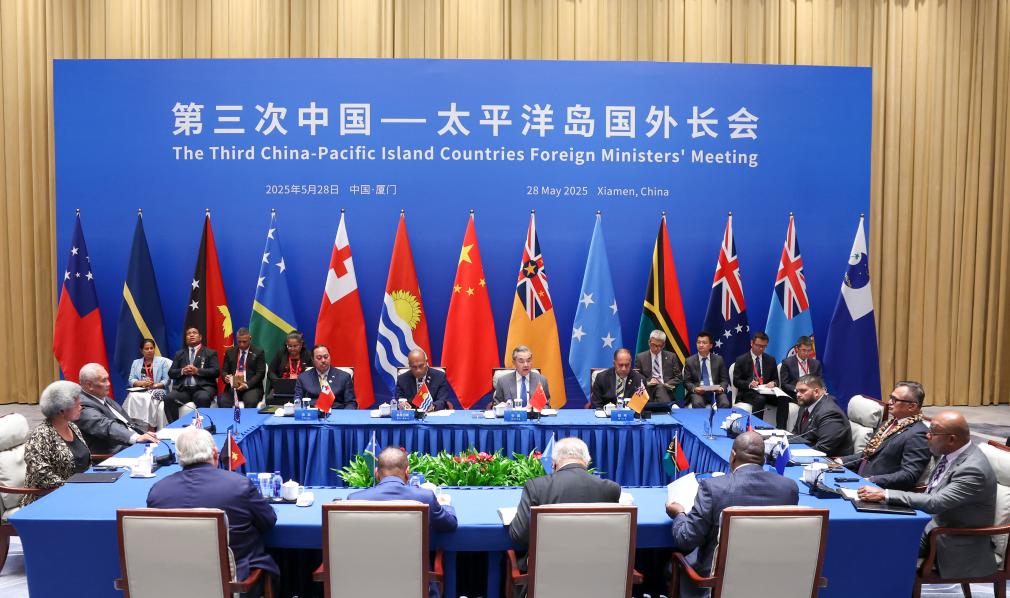
- The Pacific Island summit was held in honour of 50 years of diplomatic relations, and it aimed to strengthen regional cooperation on climate change, maritime security, and development.
- China has pledged to establish a China-Pacific Island Countries Climate Action Cooperation Fund to support climate resilience.
- The Pacific region has increasingly become a key arena for great power competition, especially between China and its Western rivals.
China hosted the Third China-Pacific Island Countries Foreign Ministers’ Summit in Xiamen on 28-29 May 2025. The meeting was attended by foreign ministers and high-level delegates from over 10 Pacific Island countries, and it was co-chaired by China and Tonga. The meeting was held in honour of 50 years of diplomatic relations, and it aimed to strengthen regional cooperation on climate change, maritime security, and development. This is a part of China’s broader outreach in the Indo-Pacific, often seen as a counter to Western influence, particularly of the U.S., Australia, and New Zealand. The timing of the meeting was strategically significant since it was held amid increasing geopolitical competition in the Pacific.
In the meeting, a joint statement was released, which reaffirmed principles of sovereignty, non-interference, equality, and win-win cooperation. Also, China has pledged to establish a China-Pacific Island Countries Climate Action Cooperation Fund to support climate resilience. Maritime Cooperation Mechanism has also been agreed upon, which focuses on strengthening ocean governance, including sustainable fisheries and marine monitoring. Commitments have also been made regarding the Belt and Road Initiative, digital economy cooperation, and connectivity initiatives. China has also offered to help with training programs and educational exchanges for Pacific Island nationals. Several of the Pacific nations have reiterated their support for the One China policy, which strengthens Beijing’s position.
Discussions also centred around how climate change is affecting the Pacific Island nations. China has also pledged to support the development of disaster early warning and climate monitoring systems. A $2 million China-PIC climate fund has been set up towards adaptation and mitigation efforts. Moreover, agreements have also been signed on marine biodiversity, conservation, and ocean monitoring. Joint Maritime Cooperation Mechanism has also been agreed upon, which plans to enhance maritime security, surveillance, and tackle illegal fishing and ocean pollution. China has also positioned itself as a long-term climate ally for vulnerable island states, which emphasises South-South Cooperation.
The Pacific region has increasingly become a key arena for great power competition, especially between China and its Western rivals. However, China has spent heavily on infrastructure, climate aid, and development, which increases its influence among the Pacific Island Countries. The recent summit held in Xiamen reflects China’s use of soft power, in the form of aid, training, and diplomacy, which helps build strategic alliances with direct military presence. Concerns have been raised about China’s growing role in the region by Australia and the U.S., fearing a debt-trap diplomacy and a reduced Western influence in the region. Several Pacific Island countries have reaffirmed their support for the One-China policy, which marks a diplomatic win for Beijing. Leaders view China’s engagement in the Pacific Ocean region not as an alignment, but as a means to secure climate survival.
The summit helped China reinforce its position as an important strategic partner for the Pacific Island nations. China’s deeper role in the Pacific signals a realignment, which further challenges the role of Western powers in the region. Despite ongoing geopolitical tensions, the Pacific Island countries are asserting their agency by following a multi-aligned diplomacy that focuses on their development.
References:
- https://www.reuters.com/sustainability/climate-energy/china-offers-pacific-islands-increased-support-addressing-climate-change-2025-05-29
- https://english.news.cn/20250529/f49ebbfe290642d3a18f516b2a5c7a16/c.html
- https://www.ft.com/content/197ae054-9f6f-4e2a-bfd0-b1eb216daee4
Archita Gaur is a postgraduate student at the School of International Studies, JNU. She specialises in the World Economy and has a strong interest in public policy, economic research, and governance. The views expressed are the author’s own.
